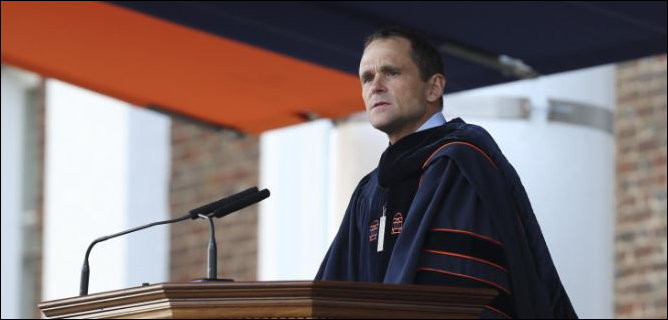Jim Ryan, the new president of the University of Virginia, made quite the splash in his inaugural address last week: He promised to make attendance at the elite institution tuition-free for students from families earning less than $80,000 a year, and to provide free tuition, room and board for student from families earning less than $30,000 a year.
“Here is what I see when I look ahead over the next decade or so,” Ryan said, as reported by the Daily Progress. “I see a community that opens wide the door to opportunity for first-generation, low- and middle-income students … There is more work to be done in this space, but we might as well get started.”
UVa’s financial assistance program already provides significant aid to lower-income UVa students. According to the Daily Progress, “UVa promises to meet a student’s demonstrated financial need through scholarships, loans and grants, but in-state students may need to take out up to $4,500 in loans per year.” What Ryan’s promise means for UVa finances and its progressive tuition/financial aid model, however, were not clear either from his speech or the Daily Progress article.
The promise of increased financial aid was but a small part of his address, which explored the theme of the University as an “unfinished project.” In describing what he sees for UVa over the next decade or so, he said:
I see a community, first and foremost, that rests on an exceptionally strong moral foundation. A university that lives its values; that embraces honor and acts honorably; that studies sustainability and practices it; that promotes justice and is just; that endorses free speech and academic freedom and protects them robustly. My friend Drew Faust, from whom you just heard, often said that universities should try to be not just great, but good. I agree and would take it one step further: I believe that in the future, it will not be possible for a university to be great unless it is also good.
With his emphasis on environmental sustainability (I doubt he’s referring to fiscal sustainability) and justice (presumably of the social justice variety),
Ryan reveals himself as a standard-issue liberal-progressive. Conspicuously absent from his speech was any mention of embracing wealth creation or cultivating personal virtue — foundations without which no society can either afford environmental sustainability or enjoy social justice. It is reassuring to hear, at least, that he remains committed to the antiquated virtue of honor and that he will “robustly” protect free speech and academic freedom.
“I see a community that is as vibrant as it is diverse, a community bound by shared values of … honor and integrity, openness and civility, intellectual rigor and human compassion,” said Ryan.
That sounds like a back-handed endorsement of intellectual diversity. So, that’s something.
There’s one other thing we didn’t hear in his speech. We heard about expanding financial aid, but not where the money would come from. We heard nothing about curtailing costs, asking tenured faculty to teach more, making R&D pay its own way, or reducing administrative overhead. When it comes to the business of running the university, Ryan appears to be a status quo president.
As a humble alumnus, my vision for UVa is to create an institution that is more affordable for everyone by keeping a lid on costs rather than an institution that makes attendance affordable for some by raising tuition for others. It’s also crucial, I believe, for even the lowest-income students to bear a portion of the cost of attendance. Everyone needs to have “skin in the game,” or attendance becomes just another entitlement. Finally, if UVa wants to maintain its intellectual vitality, it cannot become an academic mono-culture. It appears that Ryan doesn’t want that to happen, but he will face intense pressure to impose conformity. Actions speak louder than words. We will watch what he does.


Leave a Reply
You must be logged in to post a comment.